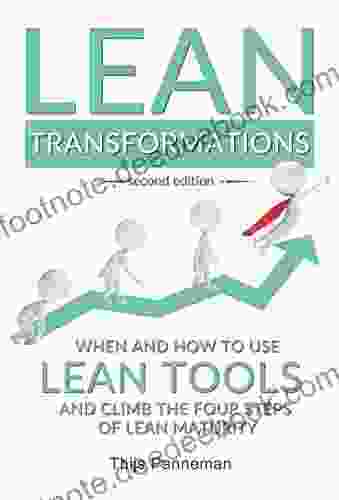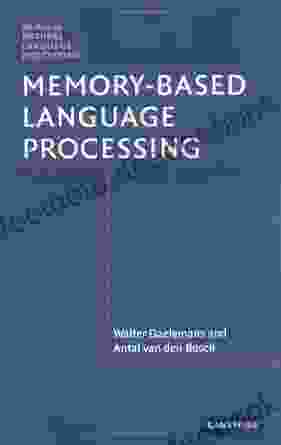Memory-Based Language Processing: A Comprehensive Overview in Natural Language Processing

Memory-Based Language Processing (MBLP) is a subfield of Natural Language Processing (NLP) that utilizes memory-based techniques to process and understand human language. MBLP algorithms learn from previously encountered data and store this knowledge in a memory structure. When presented with new data, they retrieve the most similar data from memory and use it to make predictions or decisions.
MBLP techniques have been successfully applied to a wide range of NLP tasks, including:
- Part-of-speech tagging
- Named entity recognition
- Machine translation
- Question answering
- Text summarization
There are two main types of MBLP techniques:
5 out of 5
| Language | : | English |
| File size | : | 2720 KB |
| Text-to-Speech | : | Enabled |
| Print length | : | 198 pages |
| Lending | : | Enabled |
- Instance-based learning: These techniques store individual instances of data in memory and retrieve the most similar instance to a new instance when making predictions.
- Model-based learning: These techniques learn a model from the data in memory and use this model to make predictions for new instances.
Instance-based learning algorithms are typically simpler and faster than model-based learning algorithms, but they can be less accurate. Model-based learning algorithms can be more accurate, but they can be more complex and slower to train.
MBLP techniques have been used in a wide range of NLP applications, including:
- Machine translation: MBLP techniques can be used to translate text from one language to another.
- Question answering: MBLP techniques can be used to answer questions about a given text.
- Text summarization: MBLP techniques can be used to summarize a given text.
- Named entity recognition: MBLP techniques can be used to identify named entities (e.g., people, places, organizations) in a given text.
- Part-of-speech tagging: MBLP techniques can be used to assign part-of-speech tags to the words in a given text.
MBLP techniques offer a number of advantages over other NLP techniques, including:
- Simplicity: MBLP techniques are relatively simple to implement and understand.
- Efficiency: MBLP techniques can be very efficient, especially for small datasets.
- Robustness: MBLP techniques are robust to noise and errors in the data.
- Interpretability: MBLP techniques are relatively easy to interpret, which makes them useful for debugging and understanding NLP systems.
MBLP techniques also have some disadvantages, including:
- Scalability: MBLP techniques can be difficult to scale to large datasets.
- Accuracy: MBLP techniques can be less accurate than other NLP techniques, especially for complex tasks.
- Memory requirements: MBLP techniques can require a lot of memory to store the data in memory.
Current research in MBLP is focused on a number of areas, including:
- Developing new MBLP techniques: Researchers are developing new MBLP techniques that are more accurate, efficient, and scalable.
- Applying MBLP to new NLP tasks: Researchers are exploring new applications of MBLP to NLP tasks, such as text classification, sentiment analysis, and dialogue generation.
- Integrating MBLP with other NLP techniques: Researchers are investigating ways to combine MBLP with other NLP techniques, such as neural networks and deep learning.
MBLP is a promising area of research with a number of potential applications in NLP. As research continues, MBLP techniques are likely to become more accurate, efficient, and scalable. This will make them even more useful for a wide range of NLP tasks.
MBLP is a powerful approach to NLP that has been successfully applied to a wide range of tasks. MBLP techniques are simple to implement, efficient, robust, and interpretable. However, they can be difficult to scale to large datasets and can be less accurate than other NLP techniques for complex tasks. Current research is focused on developing new MBLP techniques that are more accurate, efficient, and scalable. As research continues, MBLP techniques are likely to become even more useful for a wide range of NLP tasks.
5 out of 5
| Language | : | English |
| File size | : | 2720 KB |
| Text-to-Speech | : | Enabled |
| Print length | : | 198 pages |
| Lending | : | Enabled |
Do you want to contribute by writing guest posts on this blog?
Please contact us and send us a resume of previous articles that you have written.
 Book
Book Novel
Novel Chapter
Chapter Text
Text Story
Story Genre
Genre Reader
Reader Library
Library Paperback
Paperback E-book
E-book Magazine
Magazine Newspaper
Newspaper Paragraph
Paragraph Sentence
Sentence Bookmark
Bookmark Bibliography
Bibliography Preface
Preface Synopsis
Synopsis Annotation
Annotation Footnote
Footnote Codex
Codex Tome
Tome Bestseller
Bestseller Dictionary
Dictionary Character
Character Catalog
Catalog Card Catalog
Card Catalog Stacks
Stacks Archives
Archives Scholarly
Scholarly Lending
Lending Academic
Academic Journals
Journals Reading Room
Reading Room Special Collections
Special Collections Literacy
Literacy Dissertation
Dissertation Awards
Awards Theory
Theory Textbooks
Textbooks Paige Tyler
Paige Tyler Matthew Dallek
Matthew Dallek Radek Kucharski
Radek Kucharski Edward Lear
Edward Lear Kirstin Chen
Kirstin Chen Rodford Edmiston
Rodford Edmiston Kimberly Willis Holt
Kimberly Willis Holt Daisy Wood
Daisy Wood Judge Victoria Pratt
Judge Victoria Pratt Cherie Magnus
Cherie Magnus Lisa Ann Scott
Lisa Ann Scott Thomas D Lynch
Thomas D Lynch Hans Joas
Hans Joas Amy Morinaka
Amy Morinaka Marcel Rodeka
Marcel Rodeka Kay L Amour
Kay L Amour David Goode
David Goode Sax Rohmer
Sax Rohmer D Sundararajan
D Sundararajan Eigel Wiese
Eigel Wiese
Light bulbAdvertise smarter! Our strategic ad space ensures maximum exposure. Reserve your spot today!

 Casey BellDo Ya Wanna Be a Wrestler, Kid?: A Comprehensive Guide to the Glamorous World...
Casey BellDo Ya Wanna Be a Wrestler, Kid?: A Comprehensive Guide to the Glamorous World... F. Scott FitzgeraldFollow ·11.9k
F. Scott FitzgeraldFollow ·11.9k Terry BellFollow ·6.3k
Terry BellFollow ·6.3k Luke BlairFollow ·8.2k
Luke BlairFollow ·8.2k Aron CoxFollow ·19.2k
Aron CoxFollow ·19.2k Edwin BlairFollow ·10.1k
Edwin BlairFollow ·10.1k Adam HayesFollow ·6.6k
Adam HayesFollow ·6.6k Jan MitchellFollow ·7.7k
Jan MitchellFollow ·7.7k Aaron BrooksFollow ·6.7k
Aaron BrooksFollow ·6.7k

 Allen Ginsberg
Allen GinsbergUnveiling the True Meaning of Enough: A Comprehensive...
: In the relentless pursuit of progress and...

 Clay Powell
Clay PowellHawker Hunter: The Jet Fighter that Shaped British...
Nestled in the halls of aviation...

 Alec Hayes
Alec HayesWhen and How to Use Lean Tools and Climb the Four Steps...
Lean is a management...

 Trevor Bell
Trevor BellVolume of Charlotte Mason Original Homeschooling: A...
Charlotte Mason's original...

 John Parker
John ParkerAscending Tristan da Cunha: A Comprehensive Guide to...
Prepare yourself for an extraordinary journey...
5 out of 5
| Language | : | English |
| File size | : | 2720 KB |
| Text-to-Speech | : | Enabled |
| Print length | : | 198 pages |
| Lending | : | Enabled |












